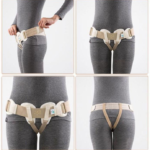Lichtenstein plastic surgery for inguinal hernia
The Liechtenstein operation is a variant of plastic surgery for inguinal hernia with strengthening of the hernia gate with a mesh implant. This technique of hernia repair is performed in children and adult patients more often than others, but has both advantages and disadvantages.
The Liechtenstein operation for inguinal hernia is the "gold standard" of surgery to remove a defect in the groin without tension on the natural tissues surrounding the hernial sac. During the operation, polymer or composite meshes are used, which have the ability to dissolve over time and promote the healing of injured tissues.
How is hernioplasty performed?
The operation has a small number of contraindications and risks; special preparation for surgical intervention is not required. Inguinal hernia repair according to Liechtenstein is performed under spinal anesthesia, less often general anesthesia is used for this.
Operation steps:
- Creating access to the hernial sac - an incision of about 5 cm is performed.
- Dissection of the aponeurosis of the oblique muscle to the inguinal ring.
- Fixation of the aponeurosis with a holder.
- Isolation of a hernia, the return of organs to their anatomical place.
- Installation of a surgical mesh.
- Sewing of the aponeurosis, the imposition of absorbable sutures.
The Liechtenstein method is suitable for any kind of hernia in the groin. This is one of the main options for getting rid of a hernia with a minimal risk of recurrence. When other techniques involve suturing the defect with surrounding tissues, the Liechtenstein hernioplasty uses a mesh that prevents re-bulging, which is the main advantage of the method.
The criterion for the quality of the operation will be the wrinkling of the mesh implant, which indicates that the plastic surgery was performed without tissue tension, which guarantees good maintenance of the hernia ring.
Contraindications for surgery
Limitations and contraindications for plastic surgery according to Liechtenstein:
- intolerance to anesthesia can become an obstacle to the operation, anesthesia in this case will end in complications;
- with a strangulated hernia , an emergency open operation is performed, plastic surgery is transferred or completely canceled;
- when there are symptoms of an acute abdomen, the operation is not performed until the exact clinic and the cause of the serious condition are clarified;
- with a large hernia, some surgeons refuse to perform a Liechtenstein operation, predicting a relapse after plastic surgery;
- previous abdominal surgery is a contraindication to plasty with mesh implant fixation;
- chronic heart disease, bleeding disorders will also limit the choice of surgical treatment;
- intestinal obstruction is an absolute contraindication.
Advantages of Liechtenstein plastic surgery
The operation became widespread due to the absence of the tension factor surrounding the hernia, which reduced the number of patients with recurrence after surgical treatment. This technique also eliminates many postoperative complications associated with the cardiovascular system.
What other advantages does the inguinal canal plastic according to Liechtenstein have:
- decrease in cases of postoperative complications by 10 times;
- relatively short rehabilitation period;
- the absence of severe pain after surgery;
- the possibility of plastic surgery under anesthesia without anesthesia;
- simple execution technique, which reduces the risk of surgeon error.
Disadvantages of the method
Among the disadvantages of Lichtenstein plastic surgery, surgeons distinguish the following factors:
- risk of injury and damage to nerves in the groin , which may result in loss of tissue sensitivity in the operated area;
- a risk of infection , but after surgery, doctors do everything possible to prevent purulent inflammation, and much depends on the patient himself;
- women have a risk of damage to the ligament of the uterus , which will lead to its prolapse, this complication is characterized by bleeding and severe pain;
- cicatricial changes can cause ischemia, testicular atrophy and dysfunction of the glands.
The likelihood of complications and recurrence of a hernia will depend on the accuracy of diagnosis and the professionalism of the doctor, especially when it comes to operating on young children.
The reason for the re-development of the disease can be the fixation of an implant that is not suitable in size and poor-quality processing of the hernial sac. In addition to the recurrence of the inguinal hernia, there are other equally disturbing consequences of the operation.
Possible Complications
The surgeon always warns about the risk of complications before the operation:
- infection of the wound and suppuration of the sutures;
- damage to organs in the hernial sac and trauma to surrounding tissues;
- inaccurate fixation of the implant with its subsequent migration;
- repetition of the disease, the development of postoperative hernia;
- complications after the administration of an anesthetic drug;
- hemorrhage with hematoma formation.
Rehabilitation
Most of the complications can be prevented by following the rules of prevention in the early postoperative period. After plastic surgery performed under general anesthesia, the initial recovery lasts 2 days, then the patient is discharged home, but is observed by the surgeon for 2 weeks. In the first 14 days after plastic surgery, a sparing diet is prescribed, which excludes constipation and bloating. The patient should refrain from physical activity and regularly wear a groin bandage during daily activities.
In the early period after surgery, you can observe changes in the groin area:
- swelling of the skin in the perineum;
- darkening in the area of the surgical suture;
- numbness or increased sensitivity;
- small bruises.
These symptoms are a normal reaction of the operated area to hernia repair. In order for the condition to remain within the normal range, it is important to take precautions.
In the first week, it is recommended not to drive a car, it is also important to exclude conditions that will provoke severe coughing or sneezing. A few days after plastic surgery, the scar must be protected from water. In the late period after surgery, the doctor may prescribe exercise therapy and physiotherapy.









